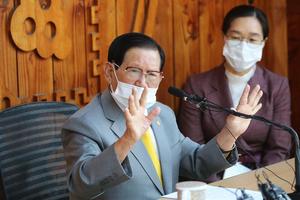Persecution of Religious Group Turns Eyes on the South Korean Government
World leaders have spoken up about the persecution against South Korean religious group Shincheonji and their Chairman following an investigation of the church's COVID-19 outbreak response.

GWACHEON, KOREA, August 06, 2020 -- In February 2020, South Korea received worldwide attention for experiencing one of the first regional COVID-19 outbreaks. The Korean government mainly attributed the outbreak to Shincheonji Church (a minority religious group) when "Patient 31", an asymptomatic carrier, attended a worship service in the Daegu church location and unknowingly spread the virus to other members.
In the following days and weeks, thousands of Shincheonji members were tested for COVID-19 as the South Korean government investigated the extent of the spread in the church. The Daegu church (where Patient 31 attended) had a higher rate of infection while other locations had no church-related COVID-19 cases. News articles were posted and circulated worldwide, referring to Shincheonji members as "super-spreaders" of the virus. Many accusations were placed against the church, its leadership, and its members.
Recent breaking news has announced the arrest of six leaders from the Shincheonji church. This includes the Chairman of Shincheonji, 89-year-old Man Hee Lee, following an investigation of the church's response to the outbreak. According to South Korean authorities, Lee's arrest is based on three claims:
1. Delaying submission of personal information of the Shincheonji church members when requested by the Korean government (intended to conduct contact tracing),
2. Embezzling 5.6 billion won ($4.7 million) from church member donations to build a Shincheonji retreat center, and
3. Using a stadium for an event without city permission in 2015.
In an interview with BBC News, a spokesperson for Shincheonji confirmed that, although delayed, lists of all Shincheonji members, church locations and affiliated buildings were provided to Korean officials. This reportedly included lists of Shincheonji members who were not infected with the virus and Non-Korean Shincheonji members in abroad churches outside of Korean jurisdiction. Shincheonji defended that although Korean law allows the collection of personal information in special circumstances (such as during an epidemic), the country also abides by the UN treaty International Covenant on Civil and Political Rights (ICCPR). The ICCPR states that individuals have the right to be free from religious discrimination (Article 2) and this right is irrevocable, even in special circumstances (Article 4). According to the UN Human Rights Committee comment 22, individuals also have the freedom to not reveal their adherence to a specific religion.
The Shincheonji spokesperson added, "We were worried about releasing this kind of information because of the safety of our members." He explained, "We have seen hate crimes and violation of human rights, just because they are Shincheonji [members] and we've even seen human rights violations that led to death." The church reports that some of these lists given to the government were leaked, "outing" Shincheonji members to their families, friends and even workplaces. Since the outbreak, there have reportedly been 5,500 cases of human rights violations against Shincheonji, including firing from jobs and violence leading to the deaths of two church members.
Although much persecution has come directly since the COVID-19 outbreak, the church says that this kind of treatment is not new. Over the past 17 years, many of its members have reportedly been subjected to coercive conversion education (a term for forceful religion conversion; this practice is legal only in one democratic country: South Korea) by anti-Shincheonji family members. The church says that since 2003 there have been over 1,600 Shincheonji members subjected to coercive conversion, and two members have died while in the program.
In the wake of these accusations and arrest of the Chairman, many influential leaders have shared their concerns about the persecution against the church by the South Korean government. Human Rights activists and World Leaders who have affiliations with the Chairman of Shincheonji have raised their voices against the unfair treatment.
Mr. Lee also serves as the Chairman of HWPL (Heavenly Culture, World Peace and Restoration of Light), a non-governmental international peace organization that was founded "for global peace and cessation of war." HWPL reports active peace work in more than 170 countries and is working to establish a peace law currently in review by the UN. Mr. Lee has been credited with creating peace in the Philippines between the Catholic and Muslim communities as well as helping the Pan-African Parliament establish peace between nations. Ambassadors of this peace work include former and current Presidents, Heads of State, Prime Ministers, and religious leaders. Many of these ambassadors have used their influence to speak out against persecution of Mr. Lee and Shincheonji.
Letters have been sent to South Korean officials from leaders in India, Israel, Pakistan, Romania and more. One former member of the South African Parliament said in an interview, "We have to accept the blame for the virus that is affecting the entire world. It cannot be attributed to one individual or his church." Another statement from the President of Islamic Affairs in Lesotho said, "Indirectly blaming anyone for this horrendous pandemic is indeed unacceptable, irresponsible and completely unfair."
Several leaders of Civil Societies and religious groups in Pakistan stated in a letter: "The discriminative attitude against Shincheonji Church of Jesus should be stopped." Another statement made by several European NGOs said, "some Korean politicians blamed Shincheonji for the occurrence of the virus epidemic, perhaps to avoid accusations of their own misconduct in overcoming the crisis," and "the list of Shincheonji members given to the authorities was partially leaked, resulting in Shincheonji members being insulted and beaten in public places, and some people have been fired from their jobs." You can find this article here.
For more information regarding the facts of Shincheonji's involvement in the COVID-19 outbreak in South Korea, you can find it here in a White Paper written by experts in religion and law.
# # #
Contact Information
Katrina AndrewsNHNE
Houston, TX
US
Voice: n/a
Disclaimer
